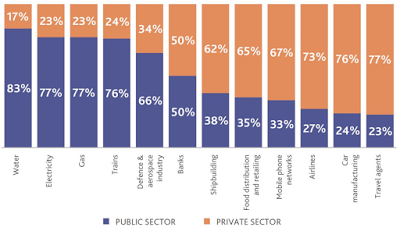Here's the summary of Legatum's opinion poll:

Commenting on the report, the Legatum Institute’s Matthew Elliott said:
“The findings of our polling are concerning for anyone committed to the principles of free enterprise. Competition entrepreneurship and free trade are all essential to achieving prosperity, not to simply generate profit for businesses, but to extend opportunity to all...
It is clear that those of us who believe passionately in free enterprise need to up our game. We need to redouble our effort in the battle of ideas, because populist thinking has a superficial attraction and we need to better articulate the case for free enterprise, which is the most effective path to prosperity.”
He's missed the point, probably deliberately, as has Jeremy Corbyn and probably most commentators. I think that people instinctively grasp the big difference between monopolies and competitive business, and are more likely to want to see nationalisation of monopolies. That is not a straight neo-liberal vs socialist thing, it is far more nuanced.
I personally see no reason to nationalise shipbuilding, food, airlines, car manufacturing or travel agents (I assume this was a trick question to identify the base level of socialist nutters who want to nationalise everything). These are competitive businesses, and happily, the majority agree.
Going down the list of things where a majority is in favour of nationalisation...
1. Mains water supply is a natural monopoly, there is simply no point laying parallels set of pipes and drains.
2. Electricity generation can be done perfectly well by private businesses and historically was. It is the national grid which is a natural monopoly, and it only exists because the UK government forced it through in the 1920s and 1930s to hook up all the existing competing electricity generators - thus enabling more competition in the first place.
3. The same sort of logic applies to gas as it does to water or the national grid.
4. People have strong views for or against rail nationalisation, it's not something I'm overly bothered about, suffice to say Transport for London does a great job, it runs the Tube network itself and co-ordinates all the private bus and train companies to provide a pretty seamless service - you can use an Oyster card on just about any mode of transport in Greater London, for example. In most other large towns, public transport is a complete mess.
5. Defence spending is largely a slush fund for a few large manufacturers, it's a heavily subsidised cartel rather than a monopoly.
6. Banking is also a cartel. Banks are brilliant at the day to day stuff, like direct debits, debit cards, online banking and so on, there is no doubt in my mind that if we had only ever had a single, government-run bank it would be really primitive in comparison. So hooray to all that. The problem is that 80% of their lending is mortgages on land so they are behind all the land price/credit bubbles and inevitable land price/credit busts.
'Nationalisation' is a crude way of dealing with monopolies, as I said before, there are various ways of dealing with them (items 1 to 6 at the end of that post), you have to decide on a case-by-case basis what to do and try and get the best of both worlds in each specific case.
This is not a 'mixed economy' approach, that is far too vague a term, but in an ideal world, the government builds the road network and private businesses make the cars (in a literal sense, but the logic applies to everything else as well).
